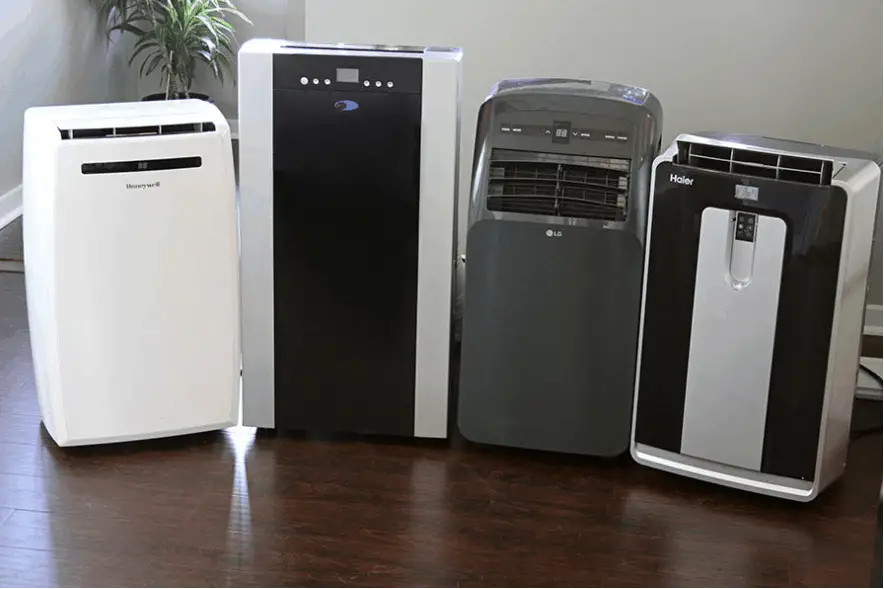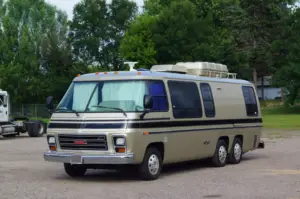Air conditioners in a rv are must these days. Temperatures that keep soaring makes it more important that you have a good air conditioner installed in your rv. Boondocking or dry camping needs you to use generator as you don’t have direct electric supply. At such times, you have to be careful how much power is being utilized by the rv air conditioner.
AC is one such item in your RV that needs more power than any other appliance and thus, you should do all these watts calculation for better and efficient use.
In this article, lets see how much watts does an rv air conditioner draw and some other considerations for using AC in your motorhome or travel trailer or any other camper.
What is the average power consumption by a rv Air conditioner
The power consumption of a air conditioner in rv will be different depending on the BTU rating of the AC. BTU is nothing but an acronym for British thermal unit, which basically measures the heat or thermal energy.
An air conditioner normally will have 2 watt ratings. A watts required to do the start up and the watts that are consumed by it during running. A start-up watts required are higher as compared to the running watts requirement. Thus, the generator you are using to run the AC should have watts more than the start watts required by the AC.
Now, coming to the main point, how many watts are needed by the air conditioner in rv? As i said, it depends on BTU, lets see average watts needed by different BTU rated air conditioners to keep running and also the start up watts. These number are average values and not accurate because it depends on lots of factors like the age of AC, brand of ac etc. A more efficient generator will use less wattage but on an average the numbers will be around the watts mentioned below.
- On an average a 15,000 BTU Air conditioner needs around 3200 to 3500 watts for start up
- On an average a 13,500 BTU Air conditioner needs around 2700 to 2900 watts for start up
- On an average a 10,000 BTU Air conditioner needs around 1900 to 2050 watts for start up
- On an average a 7,000 BTU Air conditioner needs around 1600 to 1800 watts for start up
- On an average a 5,000 BTU Air conditioner needs around 1100 to 1300 watts for start up
Similarly, the running wattage comparison for different RV air conditioners for different BTU is as below. As you can see, the watts are more than half of that required for starting up.
- On an average a 15,000 BTU Air conditioner needs around 1200 to 1700 watts for running
- On an average a 13,500 BTU Air conditioner needs around 1000 to 1300 watts for running
- On an average a 10,000 BTU Air conditioner needs around 600 to 750 watts for running
- On an average a 7,000 BTU Air conditioner needs around 500 to 650 watts for running
- On an average a 5,000 BTU Air conditioner needs around 300 to 450 watts for running
| AC BTU | Starting Watts | Running Watts |
|---|---|---|
| 5000 | 1100 -1300 W | 300 – 450 W |
| 7000 | 1600 – 1800 W | 500 – 650 W |
| 10,000 | 1900 – 2050 W | 600 – 750 W |
| 13,500 | 2700 -2900 W | 1000 -1300 W |
| 15,000 | 3200 – 3500 W | 1200 – 1700 W |
Having a look at the wattage requirements, you should be able to determine how much your power is being spent towards the ac that is already running in your RV. Or you may want to utilize this numbers to determine the capacity of generator you need to buy.
How big generator do i need to run my air conditioner in rv
Lots of companies manufacture generators, which are specially designed for rv or camper use. You can check this RV ready generator on amazon. Its very quite at 58 db and isn’t that heavy either.
The generator watt rating in your rv should be higher then the start up wattage required for your air conditioner. So, say for example you have a AC that needs 2500 watts for starting, then have a generator rated above this value.
The running wattage will always be less than anything below 1800 or in most cases, if you use a smaller BTU rv then it will be below 700. On an average the rv’s use AC’s that have running wattage in between 400-700 watts.
So, say for example you need a AC of 7000 BTU opt for a generator that has watt rating of more than 2000. A 13,500 BTU air conditioner will need a generator having watts of more than 3000. A 15000 BTU air conditioner and you need a generator more than around 4000 watts.
How do you know what BTU you need for the air conditioner? It has to do with the area of cooling and you should know approximately how much will be the area in your RV.
A 30 feet long rv, around 10 feet wide will be around 300 sq ft. And on an average that may need around 7000 BTU for good cooling. Here are some numbers that define average BTU needed for various square feet. A rv in size of around 150 square feet will be 5000 BTU
- A rv in size of around 200 square feet will need 5500 BTU
- A rv in size of around 250 square feet will need 6000 BTU
- A rv in size of around 300 square feet will need 7000 BTU
- A rv in size of around 350 square feet will need 8000 BTU
- A rv in size of around 400 square feet will need 8500 BTU – 9000 BTU
- A rv in size of around 450 square feet will need 9500 BTU – 10,000 BTU
- A rv in size of around 500 square feet will need 11,000 BTU – 12,000 BTU
| RV Area | AC BTU Needed |
|---|---|
| 200 sq. ft. | 5500 BTU |
| 250 sq. ft | 6000 BTU |
| 300 sq. ft. | 7000 BTU |
| 350 sq. ft. | 8000 BTU |
| 400 sq. ft. | 8500 – 9000 BTU |
| 450 sq. ft. | 9500 – 10,000 BTU |
| 500 sq. ft. | 11,000 – 12,000 BTU |
Considering on an average width of around 10 feet a 30 feet rv will have around 300 sq feet. A 35 feet long rv will be 350 sq feet and will need around 8000 BTU for proper cooling.
A 40 feet rv will need around 9000 BTU and so on. Based on this calculation you can finalize the BTU of the Air conditioner that you will need and then the generator size that will suit your needs. Here is a list of 10 best RV generators that you can buy (this was compiled keeping in mind watts, quality, portability and efficiency)
Also, remember its not only the Air conditioner that will be using the generator power but also other amenities like TV, refrigerator, lights, microwave etc. So, the calculation needed for deciding the max watt rating for the portable generator for your rv will depend on all of these units running wattage. It will basically be the summation of all the running watts.
Read : How many amps does a RV Refrigerator draw
Also, you need to calculate how many things can start up and run at the same time. It is basically adding all the wattage being consumed at a particular time. And all of that summation should not exceed the max rating of the rv generator.
A refrigerator on an average can consume around 400-1000 watts and a television will need smaller amount of watts, around 100-500 watts. So basically, in most cases the air conditioned has the say in deciding the generator watt rating.
So, next time when you think of shopping for an air conditioner for your rv, think of the air conditioner BTU that you will need. This will help you in getting the right generator for your RV.
Will a 2000 watt generator be good enough to run a rv air conditioner
A air conditioner for around 7000 BTU will need a starting up watts of around 1800 watts. And then the running power of around 650 watts. So, that can be the maximum BTU you can have with a 2000 watts generator. An air conditioner of above 7000 will exceed the start up watt power for air conditioner.
A 9000 BTU air conditioner needs start up watts of around 2000 and thus it wont be enough to start the air conditioner.
Once the starting wattage requirements are met and air conditioner starts running, you can use the watts for other purposes like microwave or refrigerator. Similarly, if you want to run a 13,500 BTU air conditioner then the minimum watts for the generator would be around 3500 watts.
How many amps does a rv air conditioner draw
It is important to know the amps drawn by your electrical appliances in rv in a 110 Volt AC when you are on generator, because there is a risk of circuit breaker tripping.
An rv will normally have a 30 amp or 50 amp capacity and going beyond this will be risky. It depends on the size of your rv, whether a 30 amp is good or 50 amp is suited for you. A smaller rv can work on a 30 amp, where as big 35 feet rv with lots of appliances will need a 50 amp capacity. A larger fifth wheel or a class A rv generally uses 50 amp capacity.
An air conditioner on an average needs around 12-16 amps. The exact value depends on the BTU and the mode in which it is operating. A 15,000 BTU air conditioner in rv on an average draws around 12.5-13 amps. Where as a 13,500 BTU air conditioner will draw around 12 amps.
It also depends on the mode of heating and cooling. A Heating mode will need extra amps, like a 15,000 BTU air conditioner set in cooling mode can draw a 13 amp but when set in heating mode it can draw 15 amps.
Do all RV’s come with air conditioner
Most of the rv’s will have air conditioner depending on the size. Smaller rv’s may not have the luxury of air conditioners though. Pop up campers for example may not have air conditioner installed.
Read : How to add air conditioner to pop up camper
Also, old rigs also may not have the air conditioners pre-built. If your travel trailer or RV does not have one then i suggest you go ahead with this one on amazon by dometic.
Most of the times, the newly built or recent rv’s will mostly have the roof top air conditioners that are pre built and properly fitted. These, not only save space but also remain intact without bothering you much.
Also, since they are fitted above; you don’t have to sacrifice a window for that. Most of the time they will be fitted or designed in such a way that it wont affect the overall height of the rv clearance. Bigger rv’s, more than 40 feet or even 30 feet rv are given the option of multiple air conditioners.
There are also options of having those portable air conditioner if there wasn’t one pre installed in rv. A portal AC has the disadvantage that it has to be placed somewhere in rv and that takes up space.
There are also air conditioners of rv’s that are mounted on window, like the traditional ones. With those, you sacrifice a window and also it will bother you much.
A pre-installed rooftop air conditioners need more maintenance, but with the advantages it gives; i think its okay. And any ways, scheduled maintenance of all things in a rv should be on your checklist in order to keep the rv functioning well for you.
Read : How to Keep RV cool without air conditioner
Can you use solar panels to run the rv air conditioner
Yes it is possible to run the air conditioner using your solar panel of the rv.
Solar panel kits like this one amazon are awesome and really reliable to use. A solar powered rv will need lots of considerations before you just start using it to power your rv air conditioner. Reason, the air conditioner energy requirements are too much for a solar panels to supply. In the soar panel system, the solar panel first charges the battery which then supplies the dc to various appliances.
Read : Generator vs Solar for RV
The battery can also be used to power 120 v appliances via an inverter. The Air conditioner power requirements could be anything between 2000-2800 watts and that means the inverter should be at-least above 2800 watts so that you don’t max out the power requirements. Using inverter for these kind of requirements could be impractical and hence, it will not be a good idea to run the air conditioner only using solar panels.
Thus, basically the size of the inverter, solar panels and air conditioner determine whether or not the ac can run freely or not on solar energy. It is also dependent on you battery, how big and good it is. A problem with solar panel is that it will also need sun energy to keep it going, which may not be possible always.
Also, the air conditioner and the solar panels work best when they are in opposite scenarios. A solar panel mounted rv need to be parked in a place where there is more sun, and these conditions are not best for rv ac to work. Thus, both will try negating each other effects and thus not a good combo altogether. With advances in solar energy conservation, this issue can be resolved and i am sure the solar energy will be definitely be the best way going ahead.
some tips for using rv air conditioner in better way
Air conditioner are the power drawing machines in your RV. If you are boondocking or dry camping then you need to be careful about this. Some of the tips that you can follow so as to make it easy for you during camping are as below,
1. Try cooking outside of the RV.
This will keep the temperatures inside rv to low and thus will need less of air conditioner for you, while you are inside. An outdoor cooking is not only fun but also keeps the RV out of all the cooking mess. For this, you need to shop for right groceries, grilling equipment etc. A grill for RV like this one on amazon is just the thing you need.
A cooking inside rv can heat up the entire area in rv and it takes a lot of time to cool it off.
2. Keep the AC running only when it is needed.
Generally, early dusk or the evenings tend to be cooler in almost all the seasons and running AC’s at that time is not practically. Save the power during times when you don’t really need the temperature cooling.
3. Buy an AC of BTU that best suits you.
That depends on the size of your RV, you generator power and number of rooms you have in your RV. Getting a big AC for a smaller RV will not make sense
4. Have good air circulation in RV before you actually start using AC.
At times, you feel the need of air conditioner but the temperatures are not high and a good air circulation itself can be enough to cool it down. Placing or parking your RV in correct air direction is also a key to keeping the rv cool. Parking in shades is also correct way, a sun parked rv will heat up and obviously you will get the urge of using air conditioner.
5. Buy good rated Air condition from a good brand.
A low rated ac will only pull all the power and will need more maintenance. A saving done on initial cost may not always be good for you in the long run.





